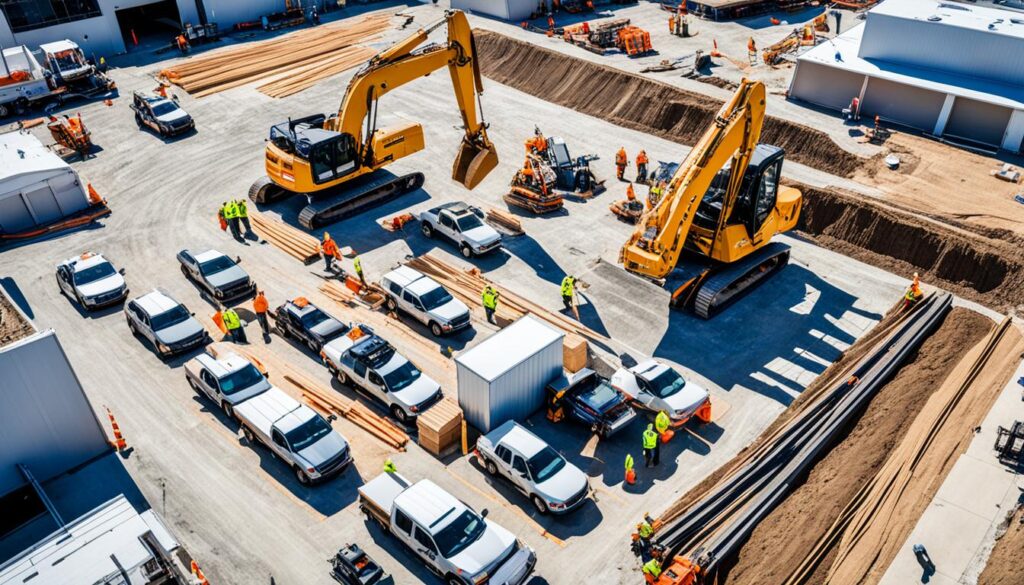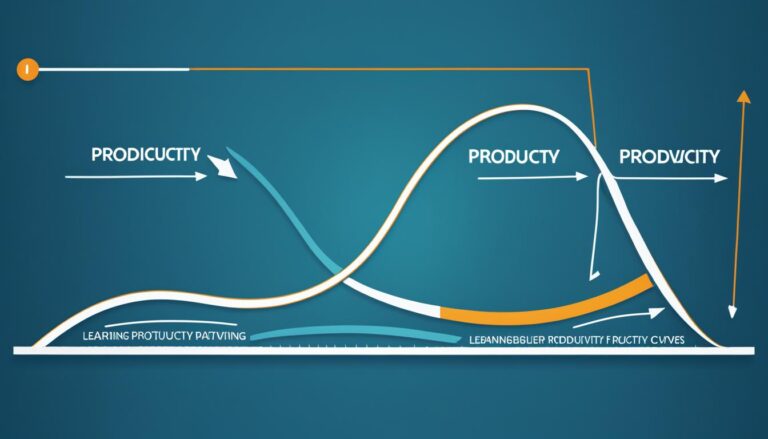Boost Your Productivity in Construction Today

Are you struggling to maximize productivity in the construction industry? Despite advancements in technology and project management, productivity in construction has only seen a marginal 1% growth in the last two decades, lagging behind other industries. So, what can you do to improve efficiency and enhance productivity in the field?
In this article, we will explore proven strategies and expert tips that can help you boost productivity on the construction site and ensure timely project delivery. From proper planning to embracing technology and prioritizing safety, we will uncover key tactics to maximize construction output and drive success in the construction industry.
Key Takeaways:
- Proper planning is essential for aligning resources and schedules with project goals.
- Embracing technology can streamline workflows and provide real-time data for informed decision-making.
- Prioritizing safety through programs and training can prevent accidents and delays.
- Organizing work sites and investing in material planning reduces waste and improves efficiency.
- Hiring trained managers with leadership skills can ensure seamless project execution and higher productivity.
Proper Planning Can Make All the Difference
Before starting a construction project, proper planning is essential to ensure success and maximize productivity. A well-developed construction project plan sets the foundation for a smooth and efficient project execution. Here are key steps to consider when it comes to construction project planning:
- Conduct Research: Thoroughly researching the project requirements, site conditions, and materials needed is crucial for accurate planning. This step helps identify potential challenges, anticipate risks, and make informed decisions throughout the project.
- Analyze Risks: Assessing and managing risks is vital to maintain project timelines and budgets. By conducting a comprehensive risk analysis, construction professionals can identify potential issues and develop contingency plans, minimizing the impact on productivity.
- Create Policies, Procedures, and Processes: Establishing clear policies, procedures, and processes ensures consistency and efficiency. These guidelines provide a roadmap for project stakeholders to follow, streamlining decision-making and reducing unnecessary delays.
- Utilize Construction Management Software: Project management software plays a crucial role in construction project planning. It allows for effective collaboration among team members and helps manage project schedules, resources, and budgets. By utilizing construction management software, project stakeholders can streamline communication, track progress, and identify bottlenecks.
- Engage Stakeholders: Involving all project stakeholders from the beginning ensures their input and commitment to the project’s success. Engaging owners, architects, engineers, and contractors fosters effective communication, aligning expectations and minimizing conflicts.
- Ensure Quality Assurance: Implementing quality assurance measures guarantees that construction projects meet the required standards and specifications. Regular inspections, testing, and documentation verify that work is completed correctly the first time, reducing rework and enhancing productivity.
By following a well-defined construction project plan, construction professionals can ensure that resources, materials, and schedules are aligned with project goals and timelines. This level of preparedness contributes to improved productivity, smooth project execution, and successful project outcomes.
Sample Construction Project Plan
| Phase | Activities | Timeline |
|---|---|---|
| Pre-construction | Gather project requirements Conduct site analysis and assessment Obtain necessary permits and approvals |
1 month |
| Design | Develop architectural and engineering plans Obtain necessary approvals |
2 months |
| Procurement | Source and order construction materials Obtain competitive bids for subcontractor services |
3 weeks |
| Construction | Site preparation and mobilization Foundation and structural work Installation of utilities Interior and exterior finishes |
6 months |
| Post-construction | Final inspections and approvals Address any punch-list items Handover to the owner |
2 weeks |

Embrace Technology and Design Better Workflows
In today’s rapidly evolving construction industry, embracing technology is essential to enhance productivity and efficiency. By utilizing advanced construction software and leveraging real-time data, you can optimize your construction processes and streamline project management. Technology enables you to make informed decisions, improve collaboration, and achieve better results.
One crucial aspect of technology adoption in construction is the utilization of project management software. This software allows you to centralize your project-related data, documents, and communication in one place, enabling seamless collaboration among team members and stakeholders. With project management software, you can access real-time data on project progress, track milestones, and monitor resource allocation.
Moreover, project management software automates time-consuming tasks and provides workflow automation tools that can simplify complex processes. This eliminates manual paperwork, reduces errors, and saves valuable time, enabling your teams to focus on critical activities. By designing better workflows through technology, you can minimize bottlenecks, optimize resource utilization, and accelerate project timelines.
Additionally, construction software applications provide centralized document storage, ensuring easy access to project plans, drawings, specifications, and other important documentation. This eliminates the need to search through physical files or multiple software platforms, allowing for quick retrieval and efficient collaboration. Centralized document storage enhances transparency, minimizes the risk of version control issues, and optimizes overall document management.
| Benefits of Embracing Technology in Construction |
|---|
| Real-time data access for informed decision-making |
| Streamlined project management and collaboration |
| Automated processes and workflow optimization |
| Centralized document storage and easy retrieval |
By embracing construction technology and designing better workflows, you can unlock new levels of productivity and drive success in your construction projects. The integration of project management software, real-time data utilization, and centralized document storage will empower your teams to work smarter, faster, and with enhanced collaboration. Stay ahead of the competition and harness the power of technology to transform your construction processes.
Make Safety a Priority
Safety is of utmost importance in the construction industry, especially in light of the ongoing pandemic. Prioritizing construction safety not only protects the well-being of your employees but also contributes to increased productivity and overall project success. By implementing comprehensive safety programs and providing thorough employee training, construction businesses can effectively prevent accidents, build trust among workers, and create a safe and productive work environment.
Investing in construction safety programs ensures that all necessary safety measures and protocols are in place. These programs include regular inspections, safety audits, and the establishment of safety procedures specific to each construction site. By incorporating these programs into your operations, you demonstrate a commitment to the well-being and security of your employees, fostering a culture of safety and responsibility.
Employee training is another crucial aspect of construction safety. By equipping your workers with the necessary knowledge and skills to identify potential hazards and follow safety protocols, you empower them to take proactive measures in accident prevention. Training should cover topics such as proper equipment handling, hazardous material management, and emergency response procedures. Ongoing training sessions and refresher courses ensure that employees stay informed about the latest safety practices and regulations.
By maintaining low accident rates and focusing on workplace safety, your construction business not only protects its employees but also avoids potential delays in project delivery. Accidents and injuries can lead to work stoppages, additional costs, and damaged reputations. Prioritizing safety not only reduces these risks but also boosts overall productivity by creating a positive work environment where employees feel safe, valued, and motivated to perform their best.
Benefits of Prioritizing Safety in Construction:
- Prevents accidents and injuries
- Builds trust and loyalty among employees
- Reduces project delays and associated costs
- Enhances productivity and efficiency on the construction site
- Fosters a positive work environment
Investing in construction safety programs and providing employee training is an essential step towards accident prevention and increased productivity. By making safety a priority, you not only protect your workforce but also ensure the successful completion of construction projects in a timely and efficient manner.

Organize Work Site and Invest in Material Planning
A well-organized construction site is the backbone of productivity, safety, and profitability. By implementing efficient site organization and investing in material planning, construction businesses can maximize their output while minimizing waste. Let’s explore how organizing work sites and managing materials contribute to improved performance and streamlined operations.
Benefits of an Organized Construction Site
An organized construction site offers numerous advantages that directly impact productivity:
- Shortened Distance for Transport: By strategically positioning machinery and materials, you can minimize the time and effort required to move them around the site. This saves valuable time and energy, allowing workers to focus on their tasks.
- Optimized Material Storage and Movement: Efficiently arranging materials on-site ensures easy access and reduces the time spent searching for or relocating them. This helps workers maintain a steady workflow and prevents unnecessary delays.
- Waste Reduction: A well-organized site enables you to implement waste reduction strategies effectively. By identifying and separating reusable materials, you can reduce construction waste and contribute to sustainability efforts.
In addition to these benefits, an organized construction site creates a safe working environment, which not only protects workers but also enhances productivity by minimizing accidents and interruptions.
Investing in Material Planning
Material planning plays a vital role in keeping construction projects on track and avoiding delays. By regularly monitoring and managing inventory levels, construction businesses can ensure a smooth flow of materials and resources. Here are some key aspects of effective material planning:
- Accurate Inventory Management: Conduct regular stock checks to maintain accurate records of on-site materials. This helps prevent shortages or surplus inventory, allowing for efficient project execution.
- Just-In-Time Delivery: Plan your material orders to align with project schedules and timelines. By adopting a just-in-time delivery approach, you minimize unnecessary storage costs and maximize efficiency.
- Supplier Collaboration: Establish strong partnerships with reliable suppliers to ensure timely and consistent material deliveries. Open communication with suppliers helps mitigate potential disruptions and keeps projects running smoothly.
By investing time and resources in material planning, construction businesses can avoid costly delays, reduce downtime, and optimize construction workflows.

Image: An organized construction site (alt: organized construction site)
Hire Trained Managers
Trained construction project managers are the key to unlocking high productivity on your construction sites. With their expertise and leadership skills, they have the ability to create schedules, manage timelines, and oversee project delivery. By hiring experienced managers who possess strong project management capabilities, you set the stage for seamless productivity and the successful achievement of your project goals.
Effective project supervision is essential for maintaining efficiency and driving productivity in the construction industry. A skilled manager understands the importance of allocating resources, coordinating teams, and ensuring that all tasks are executed within the specified timeframe. Their ability to monitor and adjust project schedules in real-time enables them to tackle challenges promptly, minimizing delays and maximizing productivity.
Leadership skills are also crucial in construction project management. Strong leaders inspire and motivate their teams, fostering a positive work environment that encourages efficiency and collaboration. A skilled manager knows how to delegate responsibilities, communicate effectively, and resolve conflicts, ensuring that every team member is working towards a common goal.
Additionally, project scheduling is a critical aspect of construction management. Trained managers excel in developing comprehensive project schedules, considering various factors such as resource availability, task dependencies, and potential risks. By creating a well-structured and realistic schedule, they optimize workflow efficiency, reduce downtime, and ensure the timely completion of project milestones.

Investing in trained managers with the right leadership skills and project management expertise is essential for maximizing productivity and success in the construction industry. Their ability to create schedules, monitor project progress, and lead teams effectively contributes to the efficient execution of construction projects, resulting in improved productivity and client satisfaction.
| Benefits of Hiring Trained Managers |
|---|
| 1. Efficient project scheduling and timeline management |
| 2. Improved coordination and delegation of tasks |
| 3. Effective communication and conflict resolution |
| 4. Enhanced team motivation and productivity |
| 5. Minimized project delays and increased project success rate |
Conclusion
Productivity is a vital aspect in the construction industry, and addressing its challenges is essential for achieving success. By implementing effective strategies, construction businesses can enhance their productivity and efficiency. The key to improving productivity in construction lies in proper planning, embracing technology, prioritizing safety, organizing work sites, and hiring trained managers.
Proper planning sets the foundation for a successful construction project, ensuring that resources, materials, and schedules are aligned with project goals. Embracing technology and utilizing construction management software enable real-time data collection and informed decision-making, leading to faster and more efficient work processes.
Prioritizing safety not only prevents injuries and creates a productive work environment but also demonstrates the commitment to welfare and trust towards the workforce. By organizing work sites and implementing efficient material management practices, construction businesses can reduce waste and minimize project delays. Lastly, hiring trained managers with leadership skills and expert knowledge in project management ensures seamless project delivery and overall productivity.
By addressing productivity challenges and employing these strategies, construction businesses can achieve increased profitability, timely project delivery, and remarkable efficiency. It is essential for construction industry professionals to prioritize productivity improvement to overcome industry challenges and establish themselves as industry leaders in today’s competitive marketplace.






